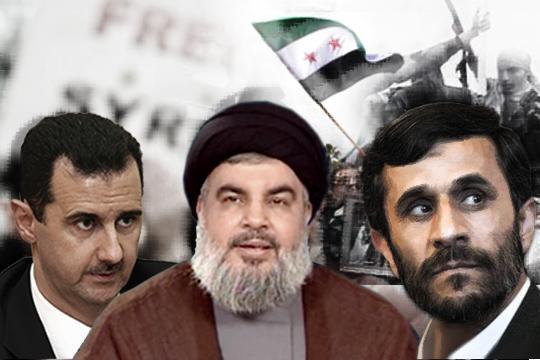
After having pointed fingers at the Syrian regime for the assassination of the Intelligence Chief of the Internal Security Forces, Lebanon’s most prominent security branch, Brigadier General Wissam Al-Hassan some crucial questions were raised in Lebanon. Most importantly was how to reconcile the two opposing policies and strategies that operate within the Lebanese government while taking into consideration that each of these policies are different in terms of legitimacy and endorsement on official and non-official levels. The first strategy, on the basis of which the government of President Najib Mikati was founded, has adopted a policy of self-distancing regarding the situation in Syria. This is in order to avoid any spill over of the Syrian crisis into Lebanon. This has become the country’s official stance and directs the government’s domestic and foreign policies, while turning a blind eye to what happens at the non-official level and otherwise goes against this stance.
The second strategy is the defence strategy put forward by Hizbullah which is based on a tripartite equation of powers: ‘the army, the people and the resistance’, also called the ‘golden equation’ by its allies. This strategy which prevails in Lebanon is evident in state-run bodies, even if some debate its legitimacy.
The essence of the two contradicting strategies lies in the last of the three elements of the equation; that is the resistance. This component has been translated locally by Hizbullah and its supporters as the so-called ‘axis of resistance’ that falls under the umbrella of March 8 Alliance. But in fact, it is this third element that has linked Lebanon regionally with this axis of resistance whose core component is Syria – if Iran is excluded in this regard. The question remains, how can Lebanon distance itself from what is happening in Syria while it is, at the same time, part of what Hizbullah calls Lebanon’s defence strategy? Syria, in this sense, is an integral part of the ‘resistance’ aspect in its local and regional dimensions.
Hizbullah and a Rising Regional Role
For Hizbullah abandoning Syria, whose past proves its centrality and importance, means losing the main element of the strength of the resistance. Hizbullah still holds that standing by the Syrian regime is premised on the party’s need to maintain the ‘arms of the resistance’, particularly its arsenal of heavy armaments which Hizbullah’s close circle argue is stored in Syria, particularly in areas that are close to the Lebanese borders.
Also, Hizbullah is no longer very keen on being discreet about its constituents that are engaged in the Syrian scene at a variety of intelligence and military levels for several reasons. These include the safeguarding of certain locations that are strategically important for the ‘resistance’. This safeguarding includes depots of heavy weapons, supply routes, in addition to minding some Syrian Shi’a villages and protecting interests that are associated with this minority, especially given the gravity of the havoc that could ensue after the fall of President Bashar al Asad’s regime. This would require direct intervention that would bypass any authority emerging from this rubble.
Iran and Hizbullah share a common assessment that Syria will be similar to Iraq and Lebanon in the aftermath of the wars experienced by the two countries. This means that the circumstances will allow for a multiplicity of local and regional actors to become involved.
Hizbullah, according to one of the scenarios, will have to extend its regional influence to Syria and, as some are concerned about, its expansion might reach the borders of Jordan, followed by the Gulf and Turkey. Such an influence, although likely to be modest, might have a dual impact since Hizbullah would want to compensate for what it had lost upon the fall of the regime with the opportunities provided by chaos and lack of security and stability after the fall.
Asad’s defence strategy has provided Hizbullah with the necessary foundation to achieve this end. The map of events unfolding suggest that Asad has allowed many players to reinforce their power on the ground in Syria in order to stand up to the majority of the Syrian population, both now and in the future, but also to stand up to the revolution even if these players were not necessarily supporters of Asad in the first place. As part of this policy, it seems that the Asad regime has given room for Hizbullah, and others, to create something like a special security zone to protect its strategic depth in Syria, done in collaboration with the Syrian security apparatus, or even without it, if necessary.
In conclusion, according to this analysis, Hizbullah will focus its moves on the regional level and will start to steer away its local roots and its common political and cultural discourse in order to meet Iran’s growing regional need for leverage in its challenges on several regional, Arab and international fronts.
Implications of Hizbullah’s Policy on Lebanon
Considering these scenarios, and in light of the rapid pace that things are changing in Syria, it is felt that Hizbullah will be under increasing pressure to launch a national dialogue in Lebanon. This will only intensify in order to preserve the heavy armaments which are moving, or have already moved, from Syria to Lebanon. This entails the creation of new security zones in Lebanon as a first step in order to create a means for protecting this arsenal for as long and far as possible. To this implicit end, and driven by this logic, it makes sense that Hizbullah looks to launch explicit bilateral dialogues with more than one party. Also, it is not unlikely that subsequent developments will push the party to revive ‘national dialogue sessions’ more seriously in order to discuss its ‘defence strategy’. Hizbullah, however, eventually will ensure that the dialogue sessions run according to its own, and not anyone else’s, principles and agenda.
Without a doubt, security and political tensions will be part of the dialogue and Hizbullah no doubt will not hesitate to use its weapons, as its adversary’s fear, in order to enforce this new political equation in Lebanon. According to this equation, building the Lebanese state must take into account that ‘Hizbullah’s arms and aspirations’ are in fact not only ‘a national issue’ but are ‘arms of the resistance and its aspirations’ protecting Lebanon, all of Lebanon, and that Hizbullah and the resistance are inseparable. Thus, this dialogue which will be held under security and political pressure is Hizbullah’s alternative of sparking a new Lebanese civil war where no one will be a winner. This alternative might be fully or partially endorsed, with compromises, by Lebanese and perhaps regional parties.
Al-Hassan’s Death and Dialogue
The assassination of al-Hassan came in the wake of this atmosphere where some positive signs emerged from calls by president Michel Suleiman to launch a national dialogue. However, there are fears among the March 14 alliance of the dialogue’s potential negative outcome. As such there are two different interpretations that form virtually a single pattern for understanding any security developments in Lebanon:
• Firstly, Hizbullah will benefit from the death of any figure whose seniority matches Rafik Hariri’s political position. Al-Hassan’s team will join dialogue sessions after being stripped from its most important card that had exposed sensitive areas of March 8, whose strength stems from its alliance with Syria. The latest strike against March 8 exposed the involvement of Michel Samaha, a former minister, in a bombing scheme in support of Asad, according to Lebanese security leaks.
• Secondly the timing of al-Hassan’s killing has placed Hizbullah in a critical position as any attempts to launch the desired national dialogue that could allow its local relocation to meet regional challenges with regards to Syria or Iran now will be hindered. In this sense, al-Hassan’s assassination has harmed Hizbullah as much as it has others.
But these two interpretations, given past experiences, will meet at one single point for those who have lost trust in Hizbullah: Lebanon is on the verge of accepting a ‘coercive diplomacy’ practiced by Hizbullah with the purpose of securing a friendly environment for itself on Lebanese territory by forcing opposition parties to accept this new equation, albeit reluctantly. Regardless of when the Lebanese national dialogue sessions are held, Hizbullah will need a) to develop an urgent strategy to deal with its distorted strategic depth in Syria and, b) in the medium term to develop a completely new strategy that dispenses with Syria by creating a new depth inside Lebanon that secures its significant requirements in order to grow and maintain its position without losing its popular space within Lebanese society.
In general, all players in Lebanon are aware that the strategy which Hizbullah has thus far adopted is based on linking Lebanon forces and Syria as one regional alliance that intersects politically and militarily beyond the borders of these two countries. This does not necessarily imply that Lebanon will be dragged into a civil war, but it undoubtedly will be one factor that can influence the outcome of any potential Syrian dialogue. This is because of its political and military dimensions at regional and international levels. The course of the Syrian dialogue will determine the shape of the Lebanese national dialogue which would be founded on remnants of the Taif Agreement, and that will fall with the fall of its main sponsor: the Syrian regime.
Thus, all Lebanese parties are cognisant that they need to be prepared for the implications of any new agreement in a post-Asad Syria. The repetition of another Taif in Syria, or even going further than Taif, could turn the Lebanese dialogue into a regional or international playground for players seeking a different agreement.
*Shafeeq Choucair is a researcher in Levant affairs and Islamic movements at Al Jazeera Center for Studies.
Copyright © 2012 Al Jazeera Centre for Studies, All rights reserved.
